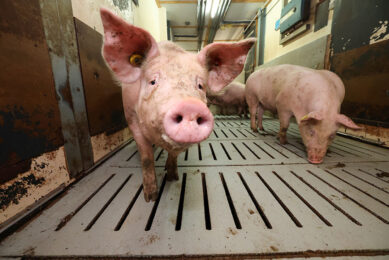Three sustainable pig farm prototypes presented
Scientists at the Wageningen University’s Animal Sciences Group (ASG) say pig production can still make some steps towards sustainability.
Earlier this week, the scientists presented a brochure called ‘Varkansen’, a Dutch pun combining the words ‘varken’ (=pig) and ‘kansen’ (=opportunities).
The research was conducted at the request of Dutch agriculture minister Gerda Verburg. Earlier similar scientific research was conducted for poultry and dairy cattle.
Three designs
The research developed three designs for more sustainability in pig production; in translation called the Pagode, the Pillar and the Pearl. These are no blueprints, but drafts that need to be worked on further. Its goal is to take pigs’ into account, just like environment,©pig producers and©consumers.
In case of the Pagode, animal health and animal well being are key. The design focuses on a family farm having 150-200 sows including finishers, located in a characteristic landscape.
The Pillar is a larger operation, having 750 sows and subsequent finishers, located in an area designated for agricultural development. In this design, the focus is on minimising odours, by using precision management around feeding, energy and manure excretion.
The Pearl design would be good to for agriculture in the neighbourhood of cities. Approximate size is 500 sows, with finishers. The farm doesn’t only yield meat, but also electricity and heat for the city.
Encouraging
The Dutch ministry of agriculture would like to encourage the development of this kind of sustainable farms. It’s now the feed to food chain that has to pick up this challenge, the ministry said.
Related websites:
• Dutch Ministry of Agriculture, Nature and Food Quality (LNV)
• Animal Sciences Group (ASG)
• Wageningen University and Research Centre (WUR)











